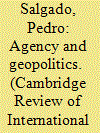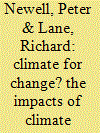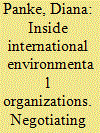|
|
|
Sort Order |
|
|
|
Items / Page
|
|
|
|
|
|
|
| Srl | Item |
| 1 |
ID:
174087


|
|
|
|
|
| Summary/Abstract |
The main narratives that explain the development of the modern international order fall short of incorporating the historical peculiarities of processes of state-formation in non-European contexts. To overcome that limitation, this paper argues that class agency must be taken as a core element to understand the social and geopolitical struggles that shape each case of transition towards modern sovereignty in its historical particularity. This is informed by the Brazilian historical experience. In that case, statehood can only be understood as an outcome of the disputes of its ruling landowning class against Portuguese colonialism, mediated by the British informal empire throughout the 19th century. In order to bring all these elements together, I follow the tradition of political Marxism to reconceptualize the very notion of “geopolitics” by grounding it in class-based strategies of reproduction and spatialization. The result is an agency-centred and radically historicist theoretical framework that rejects structuralist transhistorical logics of development. It also argues against the latent Eurocentrism present in theories of state-formation that are grounded on the European experience and simply transposed to other contexts by stressing the agency of non-European subjects in the making of their own history.
|
|
|
|
|
|
|
|
|
|
|
|
|
|
|
|
| 2 |
ID:
174083


|
|
|
|
|
| Summary/Abstract |
The geophysical phenomena of climate change impact on the existing organization of energy economies and their attendant politics in multiple ways—at times magnifying and at other times dampening pressures on contemporary energy systems. Climate change has been increasingly viewed as a 'threat multiplier'. However, the geophysical phenomena of climate change are socially and politically mediated by actors with uneven power, capacity and divergent interests in order to support either incumbent or alternative energy pathways. While climate change intensifies and magnifies existing tensions and contradictions in global energy politics around the simultaneous pursuit of growth, security and sustainability, it does not do so in any straightforward or unmediated way. Instead, it gives rise to new concerns in relation to the imperatives of de-carbonization and increasing the resilience of energy systems. Understanding the impact of climate change on energy systems requires taking seriously the necessary role of energy within the global political economy and the relationship between fossil fuels and capitalism. It must be analysed both directly through climate change’s impacts, and indirectly through the uses of political narratives about climate change to sometimes unsettle, and sometimes reinforce, particular energy pathways.
|
|
|
|
|
|
|
|
|
|
|
|
|
|
|
|
| 3 |
ID:
174084


|
|
|
|
|
| Summary/Abstract |
From the late 1960s and early 1970s onwards, environmental politics were not only put increasingly on domestic agendas, but also dealt with in international regimes and organizations (IOs). The rise of environmental IOs has led to the expectation of a greening of international politics and a corresponding contribution to improved environmental standards around the globe. This paper opens the black box of environmental negotiations in IOs and examines how active the various IO member states participate in the process of deciding upon international environmental rules and norms. This reveals two interesting empirical puzzles that the paper examines in a theory-guided methodological sound manner. First, many states joined environmental IOs and contribute to them through membership fees, but nevertheless often fail to make use of their formal right to voice positions in international environmental negotiations. Second, some states are considerably more outspoken than others, although articulating one’s position is important for the chances to influence international environmental policies. The paper argues that the former is due to lack of capabilities, while the latter is due to differences in the saliency of environmental topics across states.
|
|
|
|
|
|
|
|
|
|
|
|
|
|
|
|
| 4 |
ID:
174081


|
|
|
|
|
| Summary/Abstract |
Building on empirical qualitative material, this article argues that the international promotion of democracy is crucial to account for Tunisia’s positive transitional outcome. Specifically, the study sheds new light on the capacity of international democracy promoters (IDPs) to enhance competitive politics and contribute to the professionalization of political parties and civil society groups during Tunisia’s post-revolutionary path. The article also offers two research avenues for reviewing the negative standing on international democratic promotion in the MENA region. First it argues that promotion of democracy in transitions away from authoritarianism is more likely to succeed when a wide spectrum of transitional elites agrees upon the political system to establish and they do not enter into conflicts on how to collaborate with the IDPs. Second, it emphasizes that during a transitional period, structured and strategic partnerships between IDPs and transitional elites enable fragile societies to sustain their democratic process if internal and external anti-systemic interventions do not place obstacles in the path of this interplay.
|
|
|
|
|
|
|
|
|
|
|
|
|
|
|
|
| 5 |
ID:
174085


|
|
|
|
|
| Summary/Abstract |
This article bridges the gap between referenda and foreign policy, emphasizing the role of non-state entities as (f)actors of change in the formulation of foreign policy. Using a multi-layered (rather than a normative) analysis, it examines the Kurdistan Region of Iraq as a novel, non-state case in the international relations and foreign policy analysis literature. It argues that referenda can be pursued by non-state entities, not just state actors, and analyses the parameters of the Kurdistan Regional Government’s (KRG’s) unilateral declaration and conduct of the 2017 referendum. It perceives referenda as tools for the formulation and possible facilitation of foreign policy objectives and, in particular, claims to the formation of statehood undertaken by a non-state entity. The study, therefore, pursues a multi-level analysis looking at the contributing dynamics at the domestic, regional and international levels which demonstrate the impact of referenda on foreign policy-making and examines the catalyst role of the unit level that stands out as a determining factor.
|
|
|
|
|
|
|
|
|
|
|
|
|
|
|
|
| 6 |
ID:
174086


|
|
|
|
|
| Summary/Abstract |
In the first year of his presidency, Donald Trump rolled out principled realism as the organizing concept of his foreign policy. But does principled realism have any analytical merit as the underlying precept of Trump’s foreign policy. This paper explores the Trump administration’s use of ‘principled realism’, its contemporary context and its historical antecedents in American history. It finds that Trump uses it an empty slogan despite the essential tension it embodies in American foreign policy between the normative values and national interests. Instead, ‘sovereignty’ is a superior organizing principle of Trump’s foreign policy. In particular, this paper identifies a form of populist sovereignty that is discernible in his public statements throughout 2018. Populist sovereignty is the most distinctive feature of Trump’s foreign policy thinking. It is a doctrine of political action and government priorities that is consonant with his political instincts and that has deep roots in American political culture. Ultimately, populist sovereignty is a much more analytically useful lens through which to understand the foreign policy of Donald Trump.
|
|
|
|
|
|
|
|
|
|
|
|
|
|
|
|
| 7 |
ID:
174082


|
|
|
|
|
| Summary/Abstract |
The delegation of authority to private companies in the security domain has certain advantages for states. It optimizes security, lowers costs and eschews accountability. The aim of this article is to examine the implications of the increasing role of private security companies within, at and beyond the borders of state sovereignty. This article argues that the growing power of private security companies in the prevention and the regulation of unauthorized flows of people and goods produces contradictory tendencies for state sovereignty. As private security companies fulfil roles that were previously under the exclusive authority of state actors, states have lost their exclusivity with respect to their coercive and performative roles. Yet, the privatization of security is the result of the calculated decisions of state actors to increase their coercive power against unauthorized border crossers. Even though states’ sovereign exclusivity is being weakened with the privatization of the security domain, both state and private actors work towards strengthening states’ sovereign authority by excluding and deterring unauthorized movements of people and goods.
|
|
|
|
|
|
|
|
|
|
|
|
|
|
|
|
|
|
|
|
|